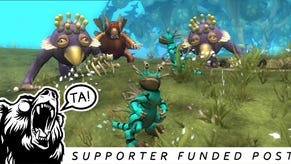EA Wise Up?
Time to stick my hand into the angry beehive again... The EA/Spore/DRM issue isn't likely to go away any time soon. In a funny sort of way, the ridiculous DRM on Spore might well turn out to be a good thing for gamers - like it or not, EA's weight in the industry means they're trend-setters to some degree. That a company so big attempted the sort of draconian copy-protection that only smaller publishers had hithero dabbled in, and crucially they now seem to realise it was a mistake, may well set a positive precedent for everyone. So, while I initially decried the mass trolling of Amazon reviews, I have to agree now that a game as high-profile as Spore was perhaps an ideal object for protest. I'd still much prefer it was gone about in a smarter way than fevered screaming, though.
Though EA aren't behaving in terribly gentlemanly fashion towards DRM-complaint posts on their forums, they are gradually backing down from some of the restrictions they unfairly placed upon Spore installs, and it looks like that trend's set to continue.
They've already increased the number of activations allowed, while the next patch will allow more usernames per copy of Spore, which should ease the problems of multiple family members playing the same copy of the game at least a little bit. There's also talk of iTunes-esque PC activation/deactivation at the user's end - not much use in the event of a hard drive fail, but will help delay the pleading phonecall to EA's reauthorisation helpline.
Now they're even admitting to something that we all know, but some of its developers (helloooooo Crytek) don't seem to: that a Bitorrented copy of a game doesn't always equate to lost cash. Via Softpedia, EA corporate communicatiosn bod Mariam Sughayer:
“Stepping aside from the whole issue of DRM, people need to recognize that every BitTorrent download doesn’t represent a successful copy of a game, let alone a lost sale."
Clearly, there's so much resentment towards what EA did with Spore that some folk will simply never trust 'em again, and of course this isn't anything like the total DRM-removal we'd like to see, so it's not enough to ease all the hurt. But c'mon, it's a positive step: even if it's not an outright admission of failure, it's one of the biggest game companies in the world realising harsh copy protection is a bad idea, and that can only set a precedent for the wider industry. Softpedia also reckons we can expect more community features from EA to counter-piracy - i.e. the kind of stuff that's worked out well for Steam and Stardock. O brave new world?
(Waits for EA to do something else really bloody stupid and blow the goodwill all over again).









